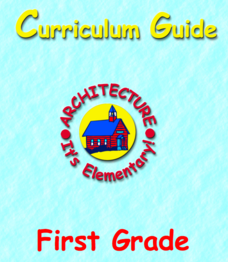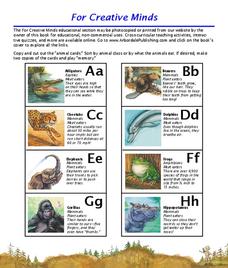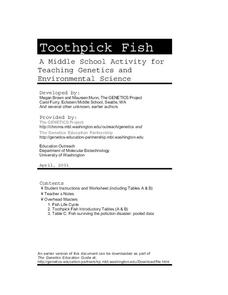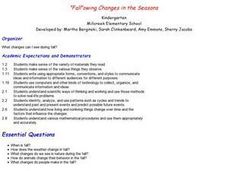American Institute of Architects
Architecture: It's Elementary!—First Grade
Build an interest and appreciation for architecture in your young learners with this fun 10-lesson art unit. Engaging children in using their five senses, the class first observes the environment around them, paying...
Curated OER
ABC Safari
Students study the animals and their alphabet letter. In this animal alphabet lesson plan, students associate the animals with their letter and learn facts about the animals. Students may use the cards to classify animals by groups or...
University of Washington
Toothpick Fish
With colored toothpicks representing genes, youngsters practice passing them through generations of fish and learn about heredity. Consider this as an introductory activity since it does not represent recessive genes with lowercase...
Curated OER
What's the Frequency, Roy G. Biv?
Introduce starting space scientists to the electromagnetic spectrum, expecially the portion of visible light. Teach them about wavelength and frequesncy. Then give them a roll of adding machine tape and a manila folder to make a...
Curated OER
The Game of Life
Students explore the game of life which refers to what happens to a species when most of the population is gone. In this endangered species lesson, students describe what it means for a marine animal to be endangered. Students then...
Curated OER
"Fall"owing Changes in the Season
Students create a whole class A-B-"C"eason Book. Each student is responsible for creating a "letter" page relating to changes, adaptations, or other fall concepts. After hard copies of the class ABC books are created, the teachers using...
Curated OER
Learning About Pets
Students study different pets. In this pets lesson, students look at pictures of animals and identify different pets. They look at homes for pets and color pictures of animals that can be considered pets.
Curated OER
Caterpillars - Page 3
Students explore patterns and how they repeat. They explore the different types of patterns (color, numbers, shapes, letters, etc.)
Curated OER
The Stroop Effect
Students explore the specific areas of the brain that process different types of information. They examine processing conflicts. Students participate in a hands-on minds-on activity using the Stroop Effect. They design psychological...
Curated OER
The Magic School Bus Goes to Mussel Beach
Students investigate tides and create a model of an intertidal zone. In this hands-on marine science lesson plan based on a Magic School Bus book, the teacher leads students in a discussion about tides, then helps students model a tide...
Curated OER
Fall vs. Spring
Students compare and contrast the seasons of fall and spring. In this fall and spring lesson plan, students learn the differences between fall and spring through books and pictures, identify the differences, draw their own pictures, and...
Curated OER
Contribution to the Beautification of Parma
First graders participate in beautification project in their local area. In this community service lesson, 1st graders plan and prepare a flower planting project for a low income area of their city. They practice arranging flowers in...
Curated OER
Punnett Squares/Genetics
Ninth graders complete a monohybrid cross and a dihybrid cross. In this biology lesson, 9th graders predict the traits of offspring using the Punnett square. They differentiate recessive and dominant genes.
Curated OER
Candy Keys
Students experiment with dichotomus keys using different types of candy. They complete a worksheet while making five different keys. They eat the candy to end the lesson.
Curated OER
Amazon Alphabet
Students create an alphabetic Amazon animal mural, illustrating the diversity of life in the tropical rain forest of the Amazon Basin.
Curated OER
An Alphabet Journey Through Space
Third graders author a book about the universe to be shared with a younger audience. After compiling an alphabetic list of words related to the universe, 3rd graders research a definition for each word and put them in book form. Books...
Curated OER
Habitat Is Home
Students are introduced to the concept and components of a habitat. They discuss the key components of a habitat and describe how certain factors can cause disturbances in a habitat and change its population. Activities are leveled for...
TeachEngineering
Teach Engineering: Haptics: Touch Command
Students experience haptic (the sense of touch) feedback by using LEGO MINDSTORMS NXT robots and touch sensors to emulate touch feedback recognition. With four touch sensors connected to LEGO NXTs, they design sensor attachments that...

















